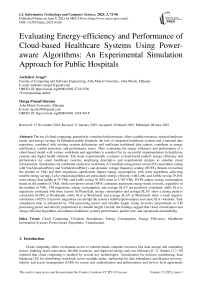Evaluating Energy-efficiency and Performance of Cloud-based Healthcare Systems Using Power-aware Algorithms: An Experimental Simulation Approach for Public Hospitals
Автор: Aschalew Arega, Durga Prasad Sharma
Журнал: International Journal of Information Technology and Computer Science @ijitcs
Статья в выпуске: 3 Vol. 17, 2025 года.
Бесплатный доступ
The use of cloud computing, particularly virtualized infrastructure, offers scalable resources, reduced hardware needs, and energy savings. In Ethiopian public hospitals, the lack of integrated healthcare systems and a national data repository, combined with existing systems deficiencies and inefficient traditional data centers, contribute to energy inefficiency, carbon emissions, and performance issues. Thus, evaluating the energy efficiency and performance of a cloud-based model with various workloads and algorithms is essential for its successful implementation in healthcare systems and digital health solutions. The study experimentally evaluates a cloud-based model's energy efficiency and performance for smart healthcare systems, employing descriptive and experimental designs to simulate cloud infrastructure. Simulations are conducted on diverse workloads in CloudSim using power-aware (PA) algorithms (along with VmAllocationPolicy and VmSelectionPolicy), and dynamic voltage frequency scaling (DVFS). Results reveal that the number of VMs and their migrations significantly impact energy consumption, with some algorithms achieving notable energy savings. Lr/Lrr-based algorithms are particularly energy-efficient, with LrMc and LrrMc saving 29.36% more energy than IqrMu at 55 VMs, and LrrRs saving 30.20% more at 1,765 VMs. DVFS adjusts energy consumption based on the number of VMs, while non-power-aware (NPA) consumes maximum energy based on hosts, regardless of the number of VMs. VM migrations, energy consumption, and average SLAV are positively correlated, while SLA is negatively correlated with these factors. In PlanetLab, energy consumption and average SLAV show a strong positive correlation (0.956) at Workload6, while SLA at Workload2 and average SLAV at Workload1 show a weak negative correlation (-0.055). Excessive migrations can disrupt the system's stability/performance and cause SLA violations. Task completion time is influenced by VM processing power and cloudlet length, being inversely proportional to VM processing power and directly proportional to cloudlet length. Overall, the findings suggest that cloud virtualization and energy-efficient algorithms can enhance healthcare systems performance, patient care, and operational sustainability.
Cloud Computing, Cloudsim Simulations, Energy Consumption, Energy Efficiency, Healthcare Information Systems, Power-aware Algorithms, Virtualization
Короткий адрес: https://sciup.org/15019820
IDR: 15019820 | DOI: 10.5815/ijitcs.2025.03.06


